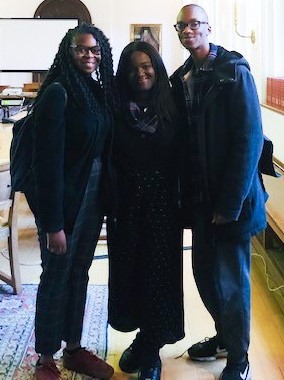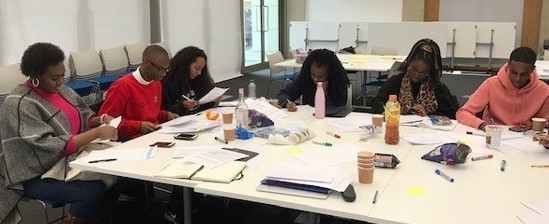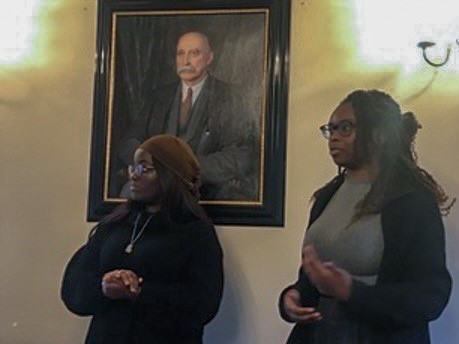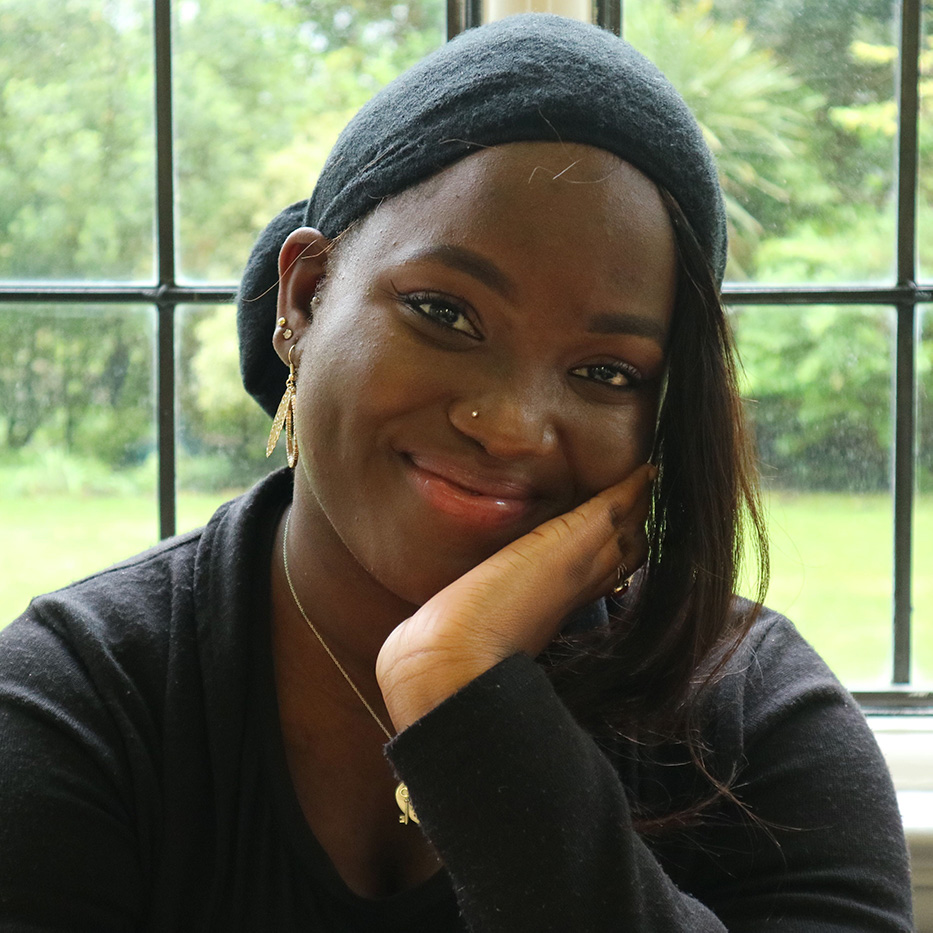Student Project: Advisory Hub
The University's Access and Participation Plan: Participatory Action Research (APP PAR) Project was launched at the beginning of the 2019-20 academic year in response to the Office for Students' focus on awarding gaps. This project, involving CCTL and 18 student co-researchers, aims to explore specific barriers and practices that impact the educational experience and attainment of black British students and disabled students with mental health conditions, the two groups with the widest awarding gaps at Cambridge.
Over several editions of the newsletter we are hearing directly from the students on the projects they conceived and the research they carried out. This month Tyra is discussing her project on an advisory hub for Black British students undertaken with fellow students Folu and Bobby.
A Black Students' Advisory Hub at Cambridge
When we set out as co-researchers on the APP PAR Project, we considered the factors that could be contributing to the awarding gap experienced by Black British students at Cambridge. Drawing from our own experiences as undergraduates, we canvassed a range of possible topics, then focused on interventions that could benefit Black students in the immediate future.
We started by considering the sorts of resources or support that our fellow students currently use. More often than not, Black students rely on word-of-mouth or student-led initiatives like the African Caribbean Society (ACS) and the BME Campaign, which focus on social and/or activist matters. What is missing, we felt, is a centrally coordinated space where relevant educational information for Black students is collated, such as resources, academic support, event information, and opportunities such as internships and scholarships.
This is due in large part to the fragmented nature of the University, which has so many different Colleges and Faculties. This institutional complexity creates issues for all students, but particularly Black students, in terms of locating support that addresses their particular needs and perspectives. We also recognised that some places within Cambridge have such a lack of diversity that individual Black British students are incredibly isolated, with no local support structures.
Additionally, we felt that such a site could also provide staff with resources about anti-racist pedagogies, inclusive teaching and learning, and critical race theory, that would help them better support their Black students.

While we were asked to focus on educational interventions, we were very aware of the overlap between academic and welfare issues. All three of us have experience in some form of welfare role at Cambridge: at the time, I was a CUSU Welfare and Rights Part-Time Executive, Folu was the outgoing ACS Welfare Officer and Bobby had been named the new Ethnic and Religious Minorities Officer for his College’s JCR. We understand that issues outside of academic studies at university can have an enormous impact on the way in which a student performs, and found literature to support our general understanding that pastoral care is a factor in students’ academic performance: “on-campus support, including relationships with classmates and faculty, contribute to academic success, social satisfaction and college competition” (Hinderlie & Kenny, 2002). However, for Black students in predominantly White spaces such as Cambridge, accessing help may be especially complicated, particularly as Black students have so few Black staff and mentors to turn to.
Models for a 'Hub' at Cambridge
Our inspiration came from Michelle Obama’s memoir Becoming, where she recounts her experience as a Black student at Princeton University, and the academic and welfare support she found at what is now the Carl A. Fields Center for Equality and Cultural Understanding. The mission of this Centre is to “foster the growth and unity of the Princeton community by advancing student learning through programs and experiences that integrate self-awareness, multicultural and intercultural communication skills, social justice education and leadership opportunities”.
We looked for examples of a similar 'hub’ in the U.K. and were initially unsuccessful, as the majority of initiatives at British universities are for all BAME students (e.g. the Student Inclusion Service at Bristol University) or are staff-facing and focused on race (e.g. the Race-Ed Hub at Edinburgh University), rather than support for specifically Black students. The closest example to our proposal was found at Dalhousie University in Canada: the Black Student Advising Centre is a welcoming and supporting centre that foregrounds academic support for Black students, along with information on pastoral, financial and social matters.
Our next step was to find out what other students thought of a centralised support network at Cambridge, providing both pastoral and academic support specifically for Black British students.
Methodology
Our data collection followed three stages: a focus group discussion, a survey, and then consultation with existing expert networks within the University.
Stage 1: Focus group

We focused discussion with the other Black British co-researchers in the APP PAR project to identify the places where our peers looked for academic and pastoral support, and what they found missing, hard to locate, or inappropriate for their specific needs. This discussion formalised our interest in proposing a specifically Black Student Advisory Hub. We discussed how, while this might be resource intensive for the university, it would have an immediate impact and would meet the University’s commitment to narrow the attainment gap within the next 5 years.
We also discussed the need for more than just student-facing support and resources, but for a Hub that could support teaching staff in their understanding of race issues in educational contexts, and how they might better support their Black students. While staff allies already exist in different Faculties and Colleges, we understand that there are challenges to disseminate pedagogical resources, to understand the value of critical race theory to different disciplines, and to integrate inclusive practices into the curriculum and across the University. The Hub, we felt, would be a way of accessing and perhaps coordinating these initiatives for staff as well as students.
Stage 2: Survey
In order to collect a broader range of Black student perspectives for our project, we sent out a survey through the African and Caribbean Society which included a range of closed and open questions about the support systems that students currently use and their opinion about the proposed Black Students Advisory Hub. The survey received 36 responses, from students in 16 different disciplines across STEM and Arts/Humanities subjects. While the number of responses is limited, this small number reflects the relatively small number of current Black British students at Cambridge. The patterns that emerged in responses from this survey were still helpful in providing us with an insight into current student perspectives.
We started by asking how Black students feel about the pastoral care currently available in Cambridge, and how they feel about these sources of support when it comes to racial issues in particular. The results indicated that there was room for improvement, with only half of participants explicitly expressing satisfaction with pastoral care in Cambridge. We then asked how they would feel about having a Black Student Advisory Hub within Cambridge, with 40% of participants responding in favour. Positive responses noted things such as the value of having contact with Black students at different stages of their education which may “provide us [black undergraduates] with a vision of where we could be”. One of the things that concerned us most was that for the students who responded negatively to this idea, it wasn’t necessarily about the Hub itself but rather the hostility that they anticipated from their counterparts. For instance:
- "It sounds like an amazing idea theoretically but I’m apprehensive of how this would sort of segregate black students from the rest of the student body"
- "It would be likely to get a hostile response from certain white students which would potentially negatively affect us more"
When we asked whether or not students thought that such a Hub would be of benefit to staff, 50% answered “yes”. Students noted that as well as staff learning how best to help their Black students, there’s also the potential that “people from different departments who may not otherwise interact with each other, now have the opportunity to do so”. This led us to conclude that students are keen for staff to access resources, training and professional development which would enable them to support their Black students, and confirmed our sense that the Hub could act as a place where staff learn how best to support their Black students across disciplines, Colleges and Faculties, and in services such as Counselling.
Stage 3: Consultation

Towards the end of our Project work, we met with the Head of the Equality and Diversity Unit to discuss the role of Race Equality & Inclusion Champions and School Equality Champions, and how our proposal for a Black Advisory Hub would dovetail with the recommended actions in the Race Equality Charter action plan. This discussion further confirmed our conviction that an Advisory Hub would be of value to both students and staff within Cambridge, and inspired us to see the Hub further as a potential way to coordinate and support other student- and staff-facing initiatives focused on narrowing the attainment gap.
For example, the Anti-Racist Glossary project and the Mentoring Scheme project both involve initiatives that we think could be situated within a central coordinated Hub focused on enhancing Black students educational experiences at Cambridge.
Next Steps
Our project group was happy to hear that the Vice-Chancellor and the Senior Pro-Vice-Chancellor of Education have taken our proposal seriously. A follow-up project was quickly funded to investigate how our ideas for the Hub might be established in Cambridge, and we will be working with the Project Lead to further investigate the scope and remit. We are particularly keen for this to connect with the work of some of the other APP PAR student project teams as mentioned above, such as the Anti-Racist Glossary and Mentoring Scheme.
If you would like to contribute your perspective to this scoping review, please email enquiries@cctl.cam.ac.uk
Author
Tyra Amofah-Akardom

Tyra is an undergraduate studying Education at Fitzwilliam College. She was Education Officer for the BME Campaign and Welfare and Rights Part-Time Executive (2019-2020).
References
Hinderlie, H. H. & Kenny, M. (2002) Attachment, social support, and college adjustment among Black students at predominantly White universities. Journal of College Student Development, 43(3): 327-40.
Cambridge Teaching & Learning Newsletter vol. 1 (issue 6) August 2020
